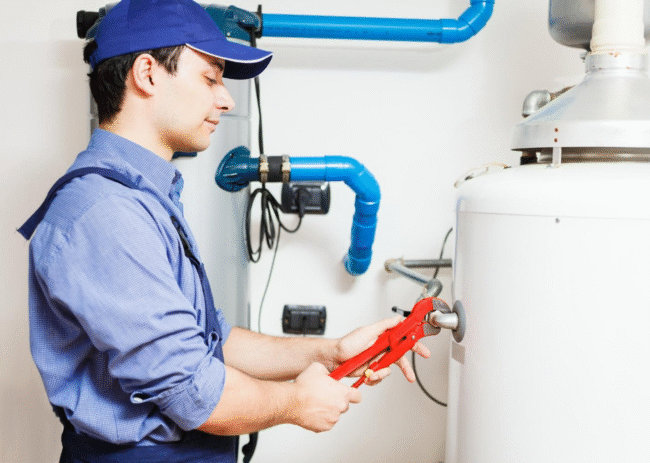
One of the more reliable appliances out there that’s working behind the scenes is a water heater. However, there are times when it stops working and you’re not getting a consistent flow of hot water for your shower. Some also need this supply for the laundry because hot water is effective in killing bacteria. See more about a water heater when you go here.
When you discover that your appliance stops working, it can be disruptive to your daily life. Fortunately, you can avoid a major breakdown by knowing how to look for subtle signs that there’s something wrong with your unit. Some of them are the following:
1. Inconsistent Water Temperature
Fluctuating temperatures when you’re bathing can be a sign that some parts of the appliance are not working as intended. When you suddenly receive a cold spurt in the middle of a shower, then it might be the right time to investigate. These changes can be caused by a malfunctioning thermostat or a buildup of sediments at the bottom.
When you ignore this problem, it can result in serious damage over time as the heating elements aren’t working as expected. Some of the parts will also work harder to compensate for the lack of heat, which can decrease the lifespan of your unit and send your bills skyrocketing.
What you need is to call a professional who can inspect the problem. These experts provide water heater services at an affordable price, and they’re going to make the necessary repairs or part replacement at a fraction of what it would cost for you to buy a new one. What’s more, they make sure that their work has warranties, so you won’t have to spend more when the repairs fail.
2. Discolored or Rusty Water
When you notice murky water coming from the hot taps, then the tank may be rusty. It indicates that there’s corrosion, and the anode rod is already worn away. This part is designed to protect the tank, and when this internal component stops working, it’s a sign that a repair should be on the way.
Letting this problem persist on its own can weaken the tank’s interior. Afterwards, the water will leak, and your only option is going to be a replacement. It’s going to be costly, and it can risk damaging your floor and surrounding areas.
What you need is to replace the anode rod because this is relatively inexpensive compared to buying a brand-new tank. Technicians will be able to flush the system and inspect the current condition of your unit. They will make sure that you’re going to continue receiving crystal-clear water for your hygiene needs. You need to address the issue today to prevent structural damage to your home as well.
3. Strange Noises from the Tank
While the operations of the heaters aren’t completely silent, they shouldn’t make loud, banging noises either. When you hear rumbling sounds, it can be a sign that the sediment has already hardened, especially at the bottom. When the burner is heating, the bubbles go through the crusted minerals that create these unsettling sounds.
Build-ups like these are going to reduce efficiency, but they can also force the unit to work harder. Over time, this is going to put a lot of stress on the tank, increasing the chance of a leak. When left untreated, it can result in overheating and a premature system failure.
What you need is to remove the sediments through routine maintenance. Flush the tank twice a year to keep the system efficient and call a technician to check for damages that may have already occurred due to sediment buildup. You can find info about how to flush the tank in this URL: https://www.wikihow.com/Flush-a-Water-Heater. The noises of the unit are also going to tell you that it needs attention, so don’t wait until the sounds turn into silence.
4. Water Pooling Around the Base
Moisture around your unit is a cause for concern, and leaks can result from a crack in the tank. Ignoring this is going to be risky, and it can cause mold growth. You can also expect structural damage and costly renovations if you don’t address the primary cause of the leak.
Sometimes, condensation may mimic leaks, and this can be okay. However, when the area around the heater is consistently damp, this is a sign of a faulty valve. Shut off the power if this is the case and call a technician because it’s the safest approach. The professionals are going to determine if there’s an issue or if it’s time for you to do repairs. Not taking action can increase the possibility of hazards occurring in your home, so don’t hesitate to call the professionals.
5. Age of the Water Heater

Many tank-style units last around 6 to 12 years with proper maintenance. However, if you notice that your appliance is pushing past its lifespan, you might be living on borrowed time. Aging appliances are less efficient, and they can be prone to a lot of breakdowns.
Even if your system appears to be working fine, the older one can cost more in operations than you realize. Efficiency can often decline with age, and an outdated model may lack energy-saving features that are present on newer designs.
This is where you may want to schedule regular inspections for your system since a licensed technician can assess the heater and recommend cost-effective actions for your benefit. When you’re proactive, you can avoid emergency replacements, and it gives you the opportunity to be more efficient.
Take the Next Step Toward Reliable Hot Water
Pay attention to your appliance, and when you notice signs like rusty water, act before disaster strikes. A professional contractor is going to help your system run smoothly, and they’re going to make sure that you can enjoy a warm shower on a cold winter night.
When you notice any of the issues above, call an expert and have your water heater inspected. Don’t wait for a total breakdown and let the professionals help restore your comfort and protect your investment.
